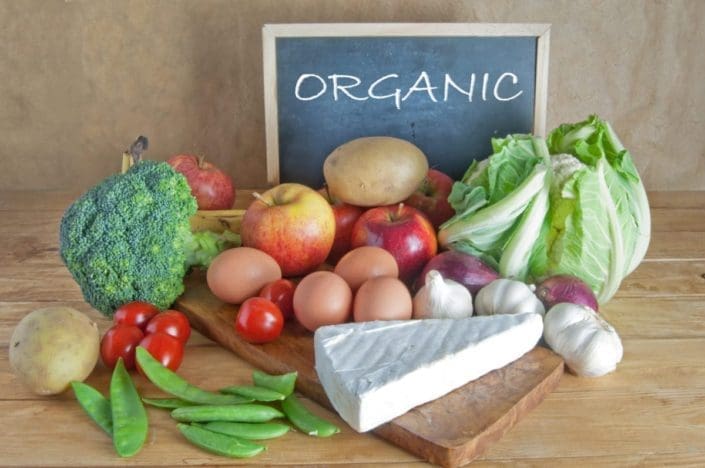Organic Foods: What You Need to Know

Related Topics
Many consumers equate the discussion "organic" with foods beingness "healthier." However, at that place is currently no link between eating organic foods and better overall wellness. Organic foods can lessen your exposure to synthetic pesticides, though. And they are grown using cleaner farming methods.
The term "organic" is divers and controlled by the U.South. Department of Agronomics (USDA). It's based on USDA inspection and certification requirements. These are the requirements that farmers, companies, and food products must meet in lodge to acquit the organic label. They include:
- Organic produce must exist grown without the use of chemicals or pesticides. Farmers must use natural means to control insects and weeds. Only natural fertilizers, such equally compost, are immune. After harvesting, farmers cannot treat nutrient with preservatives. This includes wax.
- Organic foods cannot take been contradistinct by scientists.
- Organic farming practices must protect the land to make sure it is useful for a long time.
- Organic meat and animate being products must come from livestock raised in a natural habitat. Farmers must requite them organic feed, make clean housing, and access to the outdoors. Farmers cannot apply growth hormones or antibiotics. These products are given to non-organic livestock.
Organic farming has two main goals. The showtime is to reduce the negative impact on the environment. The 2nd is to increase sustainability.
Path to improved well being
Some people see organic products equally a healthier, greener option. Remember, no food blazon or fad is a magic bullet for your health. Yous have to consider if organic foods are right for y'all and your family. You also have to decide whether you believe organic foods are healthier.
The USDA organic characterization represents natural farming and processing. It doesn't guarantee nutritional content or value. Always check nutrition labels on the packaging. Continue to follow safe food-handling procedures. Rinse your produce with soap. Go on raw meat separate from other foods earlier you cook it.
It is adept to know the facts well-nigh organic and non-organic products. This can assistance you brand informed, healthy decisions.
- Organic foods have various nutritional values. Some are more nutritious than non-organic, only not always. Others take the same value. For example, organic fruits and vegetables may have more minerals. This is due to how organic produce is farmed. However, some non-organic foods may be fortified and more nutritious than organic foods.
- Artificial ingredients. This is the main divergence betwixt organic and non-organic foods. Growth hormones, synthetic ingredients, and pesticides are mutual in foods. They may cause long-term wellness furnishings. Doctors don't know enough nonetheless to say for certain. Some people believe that eating organic foods may reduce your risk of future health problems. However, at that place is no scientific proof of this at this time.
- Flavor. Organic foods do non have preservatives. Local growers purchase them, so they tend to be fresher. They also don't have chemicals and artificial flavors. The organic label doesn't guarantee better flavor or freshness. But you might detect they taste meliorate.
- Environment. Organic farming is meant to be good for the surroundings. It reduces pollution, saves water and resources, and decreases soil erosion. Organic farmers do not use pesticides. They provide livestock with more humane living weather. Organic foods oft are sold at local stores. This reduces the pollution of shipping beyond the land.
- Lifespan. Organic products usually don't terminal as long as non-organic foods. This is considering they don't contain preservatives. Organic foods, especially produce, can go bad quicker.
- Cost. You may have noticed that organic foods cost more than than non-organic foods. This is due to the higher cost of organic farming and express supplies. As more people use organic products, prices are likely to subtract.
Things to consider
The USDA has several different organic labels. You may come beyond the following:
- 100% organic means it was grown and candy using approved methods and organic ingredients. This label frequently is seen on single-ingredient items, like fruits or eggs.
- Organic products contain at to the lowest degree 90% organic ingredients.
- Fabricated from organic products contain at least 75% organic ingredients.
Other common labels arenatural,sustainable, andgrass-fed. The USDA does not define or control these terms. In that location is no guarantee that products with these labels follow the same standards.
Questions to ask your doc
- Are organic products meliorate for chronic wellness atmospheric condition, such as diabetes, loftier cholesterol, and high claret pressure?
- Are organic products improve for meaning women and babies?
- If I can't afford organic products, am I dissentious my health?
- If I tin't beget organic vegetables, should I avoid them altogether?
![]()
Copyright © American University of Family Physicians
This information provides a general overview and may non apply to everyone. Talk to your family doctor to find out if this information applies to y'all and to get more information on this subject.
singletarycren1959.blogspot.com
Source: https://familydoctor.org/organic-foods-what-you-need-to-know/
0 Response to "Organic Foods: What You Need to Know"
Post a Comment